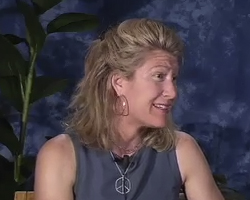TC's Lisa Miller to Appear in A&E Documentary Series
Psychological studies have shown that children and adults who identify personal spirituality as an important part of their lives are less likely to be depressed, abuse substances or become dependent on them. “We have studies on children and adults identifying personal spirituality as a resilence factor against some of the most serious forms of psychopathology,” says Miller, a practicing clinical psychologist who has conducted a decade’s worth of interviews with children of all faiths. “Quantitative research has looked at the incidence of depression, severity of depression and duration of depression and found it to be inversely proportional with the extent to which a child feels a direct personal connection to a loving, intentional absolute, whether you call it God, or the creator or the universe.”
Miller says she participated in the A&E series because “this is an opportunity to share more broadly with our culture the psychic experiences of children and to understand what their experience says about our own daily lived reality.
“Often children are quite depressed and confused by their experiences – not by the experience itself, but by the feedback they’ve gotten, whether in their own families or in the school setting,” she says. “What I’m concerned about is that clients who come in with psychic experiences are wrongly diagnosed as being psychotic. The child with the psychic experience is a healthy child who has relationships, feels healthy, makes eye contact, and whose emotions are both fluid and regulated. The psychotic child, sadly and painfully, is coming unraveled in many ways, including having a distorted sense of emotions, difficulty connecting with other people and a very challenged sense of getting along in the world.”
Cultures outside the
Miller herself does believe in the veracity of psychic experiences, but ultimately, she says, “it is not necessary that a therapist pass judgment on a client’s experience. What is crucial is that a therapist not deny the possibility that a client’s experience is in fact connected to the material world. What makes a client crazy is to be told that their experiences are invalid. A therapist need not believe in the reality of psychic experiences to be supportive of a client’s direct experience.”
To learn more about the A&E documentary series, visit www.aetv.com
Published Thursday, Jun. 12, 2008
